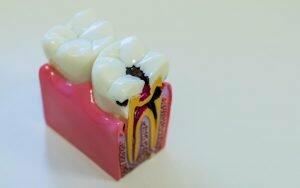An abscess by definition is a pocket of bacterial infection, or pus, in a closed space somewhere within the tissue of the body. A dental abscess then, also called a periodontal lesion, is a pocket of infection that forms around a tooth in the gum tissue or bone. There are three types of dental abscesses:
- Periapical Abscess (around the tooth root) is an infection of the soft pulp of the tooth
- Periodontal Abscess (around the gum) is an infection of the supporting bone tissue structures of the teeth
- Gum or Gingival Abscess is an infection within the gum tissue only and does not affect the tooth or the periodontal ligament
All types of dental abscess can be extremely painful, and may be either acute (they appear quite suddenly) or chronic (they may have been present for a long time).
What Causes A Dental Abscess?
In basic terms, a dental abscess results from complications of a bacterial dental infection.
Periapical abscesses are caused by bacteria traveling through the pulp space (where the ‘nerve’ is) down to the bottom end of the root of the tooth. These abscesses are typically caused by dental decay and bacteria getting into the pulp through tiny holes in the hard outer layer of the tooth, causing infection.
Periodontal abscesses are caused by bacteria traveling down between the tooth and the surrounding bone. Many times, these abscesses occur in people with periodontal disease where the bacteria have already caused bone loss. When the bacteria get wedged into a small closed space it then festers and causes a dental abscess.
Gum or gingival abscesses are caused by inflammation and infection resulting from injury, trauma, or any excessive orthodontic force on the surface of the gum tissue. In some cases, perforation of the gum walls during a root canal treatment or scaling procedure may also result in bacterial infection leading to a gingival abscess.
Symptoms Of A Dental Abscess
Depending on the type of dental abscess you have, you might experience any or all of the following symptoms:
- Pain in the affected or surrounding area, often radiating to the ear, jawbone, and neck
- Swelling of the gums, tongue, or cheek
- Enlargement of the lymph glands
- Difficulties opening the mouth
- Difficulties swallowing
- Sensitivity to hot or cold foods and liquids
- Earache-like discomfort
- Fever
- Malaise (a general unwell feeling)
- Bad breath or foul taste in the mouth
- Insomnia
How Is A Dental Abscess Treated?
Regardless how an abscess forms it is crucial to have it treated immediately. Left untreated, a dental abscess may become large enough to perforate bone and extend into the soft tissue, eventually becoming cellulitis, which can be life-threatening as the infection spreads very rapidly.
Standard treatment of a dental abscess includes antibiotics to help rid the body of infection, and drainage of the abscess to remove the pus.
With periapical abscess, a root canal treatment (removal of the infected pulp followed by a root filling) is often warranted.
With periodontal abscess, deep scaling or surgery is required to remove the infectious agents in order for the support system to regenerate.
With gum or gingival abscess, the pocket of infection needs to be drained and any excess debris removed. Your dentist will also check to see if the infection has spread to the tooth pulp or surrounding bone.
Pain Management
While waiting for treatment from your dental professional, relief may be found with OTC (over the counter) pain medication. However, these medications are for temporary pain relief only – they are not meant to replace professional treatment of your dental abscess, a very serious condition.
The following actions may also help while waiting for treatment of your dental abscess:
- Use a soft toothbrush for brushing
- Do not floss around the affected area
- Rinse with warm salt water
- Chew on the opposite side of your mouth
- Avoid very hot or cold foods and drinks
Complications
Left untreated, the infection from a dental abscess can spread rapidly, leading to a whole host of serious health complications — some of them life-threatening:
- Osteomyelitis (infection of the surrounding bone) – often requiring surgical removal of the affected bone and tissue
- Dental cysts – if not treated, a fluid-filled cavity called a dental cyst may form at the bottom of the root of an abscessed tooth, potentially requiring surgical removal if it becomes infected
- Tooth loss – if caught early, a dentist may be able to save the abscessed tooth with root canal treatment; if not, the whole tooth may need to be removed resulting in tooth replacement therapy (implants, dentures, etc.)
- Sinus infection – infection from an abscessed upper tooth can rapidly spread to the sinus area, causing extreme pain and even breathing complications

- Ludwig’s Angina – this is a potentially fatal condition resulting from dental abscess infection spreading to the floor of the mouth, causing swelling and pain in the neck; in severe cases even obstructing the airway
- Septicemia – if the pocket of infection from an abscessed tooth ruptures, the infection floods into the bloodstream causing septicemia, a very serious, potentially life-threatening condition
- Brain abscess – infection from an abscessed tooth can enter the brain via a multitude of ways, causing serious health complications
If caught early, a dental abscess can be treated quite easily. However, if you choose to ignore your pain and symptoms, it can lead to more serious, potentially even fatal, systemic health problems.
Please never leave an oral infection such as an abscess untreated. If you suspect you may have a dental abscess, don’t wait – call us immediately at 905-775-5307 or click here to request an appointment on our website. We can help!

